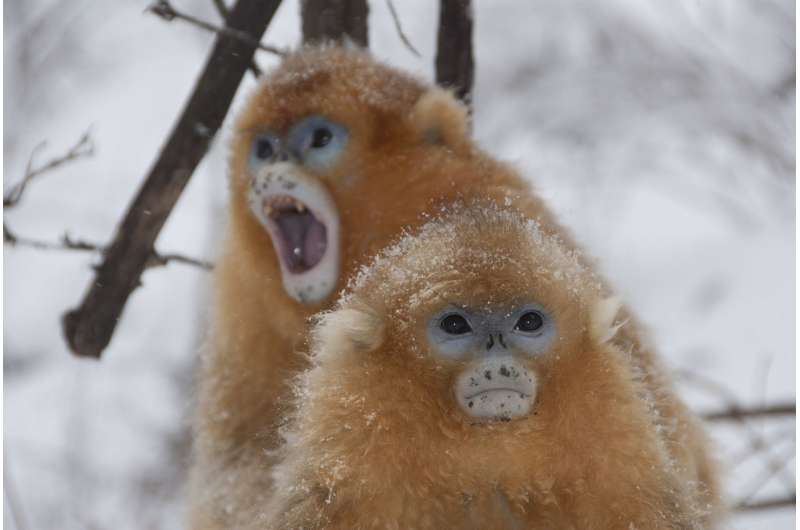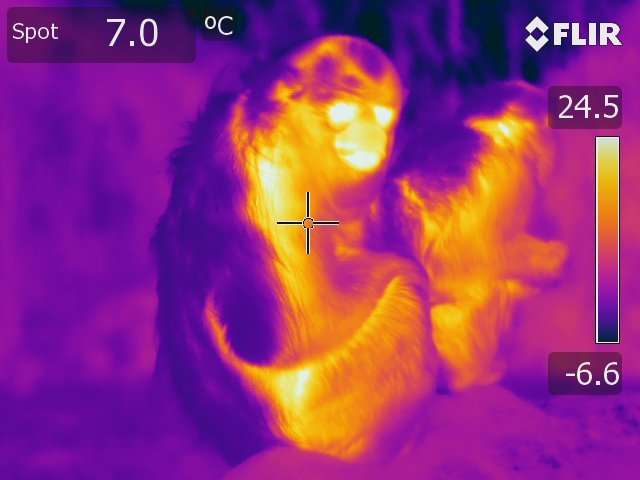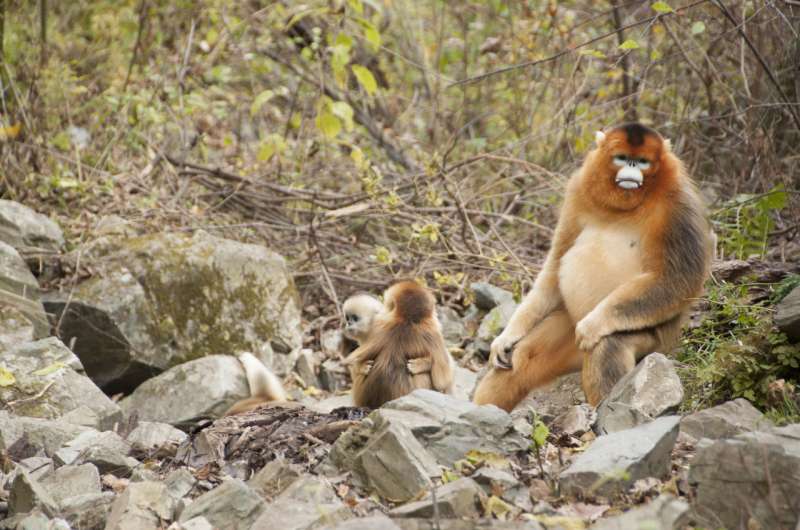Monkeys eat fats and carbs to keep warm

University of Sydney researchers have found monkeys living in the wild in cold snowy habitats adjust their nutrient intake to match the elevated costs of thermoregulation.
China's Quinling mountains, high altitude temperate forests where winter temperatures commonly drop below 0 degrees Celsius and approximately 50 cm of snow covers the ground for several weeks in the winter, was the location of the study.
Published in Functional Ecology, the researchers analysed the nutritional content of all foods the monkeys consumed in order to calculate the nutrient composition of the monkeys' diets, and then assessed the additional energy the monkeys used to regulate their temperature in winter compared with spring.
Professor David Raubenheimer, the University of Sydney's Leonard P Ullmann Chair in Nutritional Ecology at the School of Life and Environmental Sciences and Charles Perkins Centre, conducted the study's nutritional modelling using nutritional geometry, a multidimensional framework that explores how animals balance the ingestion of multiple nutrients.
"To better understand the adaptations that enable these monkeys to live and thrive in such a harsh environment—among the coldest for any primate—we tested how they cope with additional energetic costs of keeping warm in winter," Professor Raubenheimer said.

"Our study controlled for food availability using supplementary foods to ensure that food was abundant throughout the year and the amounts eaten in winter and spring were due to the animals' own choices rather than ecological restrictions on what was available to eat.
"The monkeys ate twice as much energy in winter compared to spring. Remarkably, the additional intake in winter came entirely from fats and carbohydrates, with protein intake remaining the same."
Temperature modelling was overseen by Associate Professor Ollie Jay, from the University's Faculty of Health Sciences and Charles Perkins Centre.
"Winter was shown to impose significant thermoregulatory energetic challenges for these animals," Associate Professor Jay said.
"Using thermal imaging photographs, we measured the monkeys' surface temperature at specific points on their bodies. Taking into account additional factors such as wind speed and environmental temperature, these measures were used to calculate heat lost from the body."

The seasonal difference in energy intake closely matched the seasonal difference in the daily energetic costs of thermoregulation, Professor Raubenheimer explained.
"Amazingly, we found that the additional heat lost by monkeys in winter compared with spring almost exactly matched the additional energy they ate in winter in the form of fats and carbs," Professor Raubenheimer said.
"This provides strong evidence golden snub-nosed monkeys forage selectively to balance the macronutrient content of their diet, but also change the balance to meet changes in the nutrients needed—in this case for generating body heat.
"A helpful way to think about this is from the other direction- the monkeys ate half the fats and carbs in spring compared to winter. Since foods were available for them also to have high fat and carb intake in spring, and yet they abstained, this shows that they balance their nutrient intake to meet specific nutritional needs.
"It also raises significant questions about another species of primate, that clearly does not manage its intake quite so well—our own species," said Professor Raubenheimer.
This study forms part of a broader research program in which Professor Raubenheimer is studying many species of non-human primates in the wild to help understand the reasons that humans are so vulnerable to over-eating, obesity and associated disease.
More information: Song-Tao Guo et al, Nutrient-specific compensation for seasonal cold stress in a free-ranging temperate colobine monkey, Functional Ecology (2018). DOI: 10.1111/1365-2435.13134
Journal information: Functional Ecology
Provided by University of Sydney

















